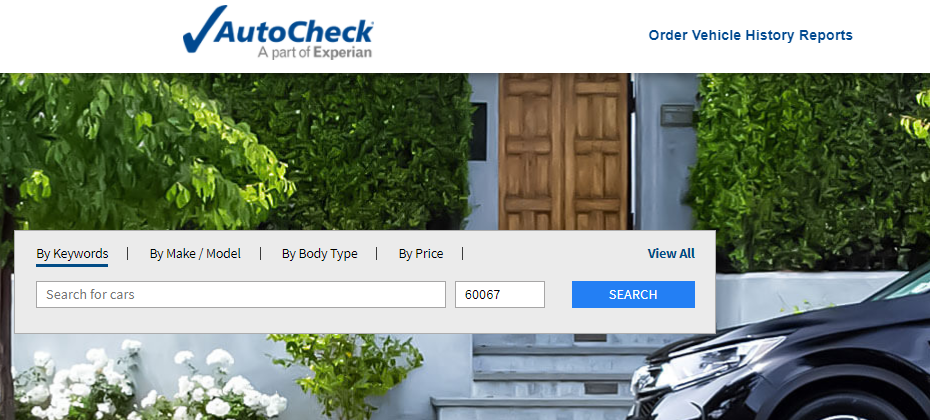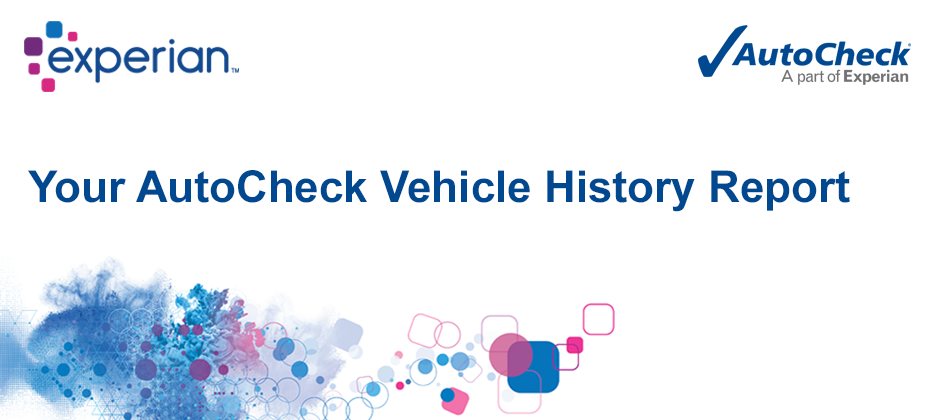Tag: AutoCheck Score

As competition for used vehicles remains fierce, dealers must make quick decisions on whether to acquire a potential vehicle—or someone else will. Whether you need to evaluate a trade-in or want to make a flat-out offer on a vehicle, quickly accessing the vehicle’s history is only the first step. What if you could determine the likelihood that a vehicle will be on the road in five years and compare it to other similar vehicles? Would this help in your decision-making? Use the AutoCheck Score to evaluate vehicles for your lot The patented AutoCheck ScoreSM was developed to help dealers determine the likelihood that a vehicle will be on the road in five years. The AutoCheck Score summarizes vehicle history data into an easy-to-understand “score” and provides an equivalent score range. Understanding the likelihood that a unit will still be on the road in five years gives dealers more perspective on a vehicle’s desirability and can help you accurately price it. Use the AutoCheck Score to more accurately merchandise vehicles The AutoCheck Score range will give you similarly aged and classed vehicles for comparison that you can use to help merchandise the vehicle for market and help manage consumer conversations regarding the vehicle’s price. How does the AutoCheck Score work? The AutoCheck Score analyzes various characteristics, including age, segment, mileage, number of owners, vehicle use, vehicle events, accidents, theft, and title brands. Essentially, this score summarizes the AutoCheck Vehicle History Report fields and delivers a “score range” that allows you to compare the actual vehicle (score) to other similarly aged and classed vehicles. The score is based on a scale of 1 to 100, but reading the score in conjunction with the score range is essential since looking at the score without knowing the range will reveal only half the story. Check out the example below. Car #1 has a lower score than Car #2. However, look at the score ranges (73-86). For Car #1, other comparable vehicles should fall into a range from 73 to 86, and this car scored an 84. That means the vehicle is within the AutoCheck Score range compared to other similar cars of the same age and class. Car #2 has a score of 89. Because this is higher than Car #1’s score, you might assume this car has a more favorable vehicle history, but that’s not entirely accurate. Comparable vehicles should score in a range from 90 to 95, and this car falls short. That means the car’s history is slightly less favorable compared to similar vehicles of the same age and class. In today’s competitive environment though, dealers may decide to take in both trades, and the AutoCheck Score can also help make decisions on how to price the vehicles for market. Become an AutoCheck member today As an AutoCheck subscriber, you’ll have access to the AutoCheck Score. Between the large graphic display and the simple number comparison, the AutoCheck Score can help you make decisions on vehicle acquisition much quicker and easier!

As more consumers turn to the internet to research and purchase preowned vehicles, dealers have focused marketing efforts to the online marketplace to get their vehicles in front of shoppers. According to Think with Google, 95% of vehicle buyers use digital as a source of information and it takes 65% of buyers just three weeks to research vehicles online prior to purchase. With seventy-eight percent of consumers visiting two or more sites during their shopping “journey”1 how do dealers capture their attention, increase lead and sales conversions? Dealers need to share key data in a vehicle history report such as information related to reported accidents, odometer readings, open recalls, and whether the vehicle qualifies for buyback protection. These details help consumers better understand and make informed decisions when shopping. Case Study: How leveraging the AutoCheck VHR subscription increased lead and sales conversions Our integration partner, CarZing, an online auto shopping portal, offered a Free AutoCheck® Vehicle History Report on their Vehicle Detail Page (VDP) which increased lead and sales conversions. Together, we analyzed six months of lead activity on millions of vehicle listings on CarZing focusing on the 200 most popular vehicles by year/make/model. Key findings indicated that vehicle listings offering a Free AutoCheck VHR on the VDPs achieved a higher lead conversion rate than listings for the same year/make/model for vehicles without a Free AutoCheck report. Here’s a few highlights from the full report: Furthermore, when layering in available sales data, sales conversion is higher for vehicles featuring a free VHR available to consumers than vehicle listings that did not. Based on the results, CarZing’s Director of Operations, Frank Merle strongly encourages all AutoCheck clients take advantage of the exponential value that offering a free AutoCheck report brings to dealership VDPs. Dealers with an AutoCheck subscription can list their vehicles for free on AutoCheck.com and CarZing.com. Simply contact your Experian account executive or call 1 888 409 2204. For dealers that are not yet subscribers, here’s a few more things you may not know about Experian AutoCheck Vehicle History Reports. We do not re-market to shoppers, resell VDP leads or offer your competitors’ inventory for consideration on AutoCheck.com. Our goal is to help your dealership sell your inventory. For dealers who are interested in learning more about the benefits of becoming an AutoCheck subscriber contact us today. 1https://www.coxautoinc.com/wp-content/uploads/2021/02/Cox-Automotive-Car-Buyer-Journey-Study-Pandemic-Edition-Summary.pdf

When we think about vehicle history, we tend to imagine two audiences: dealers and consumers. After all, identifying any potential hidden defects could have a significant impact on a used car buying decision; vehicle history reports are an invaluable part of the process. But it’s not just dealers and consumers who can benefit. It takes three things to sell a vehicle: the car (dealers), the consumer and credit; we’ve covered the first two, so let’s focus on the third. Lenders take a plethora of information into consideration when making automotive lending decisions, including a borrower’s credit score, payment history and utilization rate. But these data points only reflect the risk associated with the borrower; there’s also inherent risk with the vehicle itself. I recently participated in a virtual workshop, The Risky Side of the Road, during Used Car Week 2020, where we discussed the value of leveraging vehicle history information to minimize risk with lending decisions. Extending a loan to a borrower hoping to purchase a used vehicle with unidentified defects exposes the lender to unnecessary risk; hidden damage and maintenance costs could impact a borrower’s ability to repay the loan. To minimize portfolio risk, we recommend lenders leverage vehicle history reports, such as AutoCheck, before making a lending decision. Hidden Damage Significantly Impacts Vehicle Value Let’s consider the universe of used vehicles that could potentially be sold and financed. According to Experian’s Q2 2020 Market Trends Review, there are more than 280 million vehicles on the road. And our research indicates that four out of 10 of the cars and light duty trucks on the road have been in at least one accident, and around 20% of vehicles have been in multiple accidents. What does this mean for a vehicle’s value? Even if a vehicle has been completely restored and repaired, the value of the vehicle diminishes. According to a recent Mitchell Industry Trends Physical Damage Report, in Q2 2019, the average diminished value for a vehicle involved in an accident was $3,151; and this doesn’t include the fiscal impact of other hidden defects, such as flood damage. And the loss in value trickles down to the consumer and lender. For instance, if a lender unknowingly extends a $10,000 loan to a consumer who purchases a used vehicle that was involved in an accident, the actual value of the vehicle may be around $7,000. If the consumer decides to sell the vehicle before paying off the loan, it is very likely they will be up-side down. If the consumer falls behind on payments and the vehicle is repossessed, it will be difficult for the lender to recoup any losses at auction. But that’s where vehicle history reports come into play. Tools, such as AutoCheck vehicle history reports, inform lenders about reported accidents and recall information, among other insights. In addition, the AutoCheck Score, enables users to compare a vehicle with vehicles of similar class and age and assess the likelihood it will be on the road in five years. The AutoCheck Score can also help gauge the value and drivability of a repossessed vehicle. For example, according to Experian’s similarly titled white paper, The Risky Side of the Road, we found that the percentage of repossessed vehicles that were drivable was higher for vehicles assured by AutoCheck vehicle history reports (86.16%) versus those that were not assured (80.75%). Additionally, we found that repossessed vehicles that were drivable tend to have higher AutoCheck Score range. And unsurprisingly, vehicles that are drivable tend to perform better at auction, meaning a better return on investment for the lender. During these uncertain times, it is important for lenders to more precisely gauge the level of risk they take on. The more information lenders have about the used vehicles they are financing, the better positioned they will be to offer loan terms that minimize portfolio risk, while better meeting consumer needs. To view Experian’s white paper, The Risky Side of the Road, click here.

Introducing the newly designed AutoCheck Score™ Quickly compare and select used vehicles As an auto industry professional, you use vehicle history reports every day. But they’re long, complex — easily misinterpreted. You always aim to conduct a thorough inspection. But what if you’re at a busy auction house or browsing online, where there’s simply not enough time or context? The tool you use every day to make critical decisions about used vehicles should be accurate and easy to understand — built for streamlined evaluation. So we made one. New look, same impact We’ve revamped the AutoCheck score with a modern look and feel that’s easier than ever to read. And it’s still invaluable for quickly comparing and selecting used vehicles. What, exactly, is it? Experian® analyzes the detailed records in an AutoCheck® vehicle history report to generate the AutoCheck Score. Like a credit score or gas mileage rating for new vehicles, it’s a single number on a standardized scale. The new gauge shows the score range (from 1 - 100) for vehicles of similar age in the same class. If a car is above average in its range, you can feel confident that it’s a solid investment. The score makes it much simpler to assess how a used vehicle measures up, estimating its: Overall roadworthiness Reliability compared to other vehicles in its class Likelihood of being on the road in five years It is invaluable for making informed decisions, managing inventory, mitigating risk and instilling confidence in customers. Bigger, better You can depend on the AutoCheck Score to deliver a high-quality, more accurate assessment. That’s because it’s derived from Experian’s world-class, continually updated database, which leverages reliable information from extensive sources, including: Tens of thousands of distinct accident sources, many exclusive to Experian 95% of U.S. auction houses — most providing structural damage, salvage-and-junk and export-data announcements exclusively to Experian Important OEM safety and open recall data State departments of motor vehicles and departments of public safety, insurance companies and other independent sources Police department/state agency accident information from all 50 states and Washington D.C. Federal sources, like import records That’s a lot of data. And some complex statistical modeling. Don’t worry; we’ll take care of the heavy lifting. All you have to do is keep score. Why you need it Whether you’re a dealer, lender, manufacturer certified pre-owned program or consumer portal, the score will transform the way you do business to boost your bottom line. Dealers: Use the score to mitigate risk, manage and market your inventory, close sales faster and build customer loyalty. Lenders/Credit Unions: Use the score to more accurately estimate a vehicle’s value at every stage of the loan life cycle, from origination to portfolio review, account management and asset collection. Manufacturer Certified Pre-Owned Programs: Use the AutoCheck report for vehicle certification. Consumer Portals: Increase customer satisfaction — and traffic — by allowing OEMs and dealers to post the score with their listings and make online car shopping a breeze. Count on the AutoCheck Score To learn more about the score — or how to wield its power to maximal effect — find its secrets in this treasure trove of a white paper or call 1 888 675 5596. What are you waiting for? Redesign your business with the redesigned score.